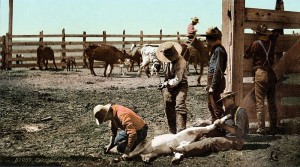 William Henry Jackson was tasked with exploring and surveying the American West at a time when America was expanding and the Manifest Destiny was still at the forefront of American ideology. Over his life of 99 years, Jackson became famous for his work with photochrom, such as the photo to the left from around 1900.[1] The branding of a calf is posed as a fairly leisurely activity, as a few of the characters stand around looking at their corral of cattle and the wide open space available to them in the West. Working for the government, Jackson often took exploration trips to photograph scenery along railroad routes and with his photography of beautiful natural landmarks, he even convinced Congress to create Yellowstone National Park. With photos like these, that show a decent life on the frontier and human’s domination over nature, Jackson’s narrow lens paints a Romantic image of the west, sure to keep out the fact that many Native Americans were displaced as a result.
William Henry Jackson was tasked with exploring and surveying the American West at a time when America was expanding and the Manifest Destiny was still at the forefront of American ideology. Over his life of 99 years, Jackson became famous for his work with photochrom, such as the photo to the left from around 1900.[1] The branding of a calf is posed as a fairly leisurely activity, as a few of the characters stand around looking at their corral of cattle and the wide open space available to them in the West. Working for the government, Jackson often took exploration trips to photograph scenery along railroad routes and with his photography of beautiful natural landmarks, he even convinced Congress to create Yellowstone National Park. With photos like these, that show a decent life on the frontier and human’s domination over nature, Jackson’s narrow lens paints a Romantic image of the west, sure to keep out the fact that many Native Americans were displaced as a result.
Just as Jackson’s work had a lot to do with the image of the West to the rest of America, composers such as Virgil Thomson and Aaron Copland composed the sounds of the Western frontier, though 30 years later and for nostalgia instead of Manifest Destiny. In Virgil Thomson’s The Plow that Broke the Plains, a film made by the Works Progress Administration in 1936, the cattle are represented by this music.[2]
Doesn’t sound similar to this music from Aaron Copland’s Rodeo from 1942?[3]
The common folk song between the two is called “Old Paint,” a paint being a spotted horse, and the song said to be a common song sung by the cowboys of the west during their night shifts of protecting the cattle. Here cowboy folk music, again excluding Native Americans, is drawn on to paint what sounds like a lackadaisical and relaxed picture of the West. This is a nostalgic, romanticized reflection of cowboy culture much like Jackson’s romantic view of the West. The extent to which this relaxed cowboy life was a reality or the authenticity with which their folk music was presented in these classical genres is debatable.
For more about early 20th century composers shaping the American West, see this NPR article.
[1] William Jackson, “Colorado-Branding Calves,” photochrom on paper, Flatten Art Museum.
[2] Virgil Thomson, writer, Virgil Thomson: The Plow That Broke the Plains, The River, Conducted by Richard Kapp, Performed by Richard Kapp, Essay, Streaming Audio, Accessed April 28, 2015. http://search.alexanderstreet.com/view/work/378497.
[3] Aaron Copland writer, Appalachian Spring/Rodeo/Fanfare for the Common Man, Conducted by Louis Lane, Recorded January 1, 1982, Telarc, 1982, Streaming Audio, Accessed April 28, 2015. http://search.alexanderstreet.com/view/work/2129722.
